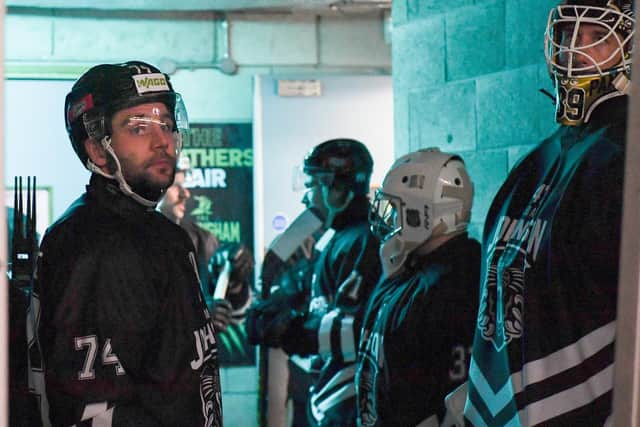Nottingham Panthers: finding the resilience to keep going through darkest of times
and live on Freeview channel 276
Nottingham Panthers have endured darkness beyond comprehension with the death of Adam Johnson after a freak on-ice collision. The two and half months which have passed have been the most difficult in the club’s history. The road back remains difficult, unchartered territory, and it is clear they are still engulfed in grief while everything around them moves on.
Assistant coach Kevin Moore’s post-game interview after a midweek loss to Glasgow Clan gave an insight into what really matters - protecting and supporting players rather than stats, shots on goal and points in the win column.
Advertisement
Hide AdAdvertisement
Hide AdIn ordinary times a 5-0 third period collapse would have the fan base demanding a shake up, lines rejigged, players shipped out, and immediate action from the coach, and, on social media it wasn’t hard to find such sentiments posted; real time reactions to loss number 13 in the last 14 outings.


But, these are anything but ordinary times for Panthers. Social media is nothing more than froth, but when it’s directed at you, or your organisation, those words can get under your skin, and they can hurt.
I get the instant reaction to a big loss - sport is about all emotion, elation, criticism and opinion - but now is the time to look up from the screen of a smart phone and see the bigger picture of a team doing what it can to continue in the immediate aftermath of a devastating trauma. The fan base is grieving too, and, for every fan posting instant criticism, I’m pretty sure there are ten or more sitting quietly, showing their support by turning up for every game and doing all they can to get the players through match nights.
I’d be tempted to play Moore’s interview on the big screen before every game. Compassion, not criticism, is what the team needs.
Advertisement
Hide AdAdvertisement
Hide Ad“It isn’t about Xs and Os,” he said. “This team right now, when one thing goes wrong happen we have trouble with grasping the focus. The reality is they watched a team mate die on the ice. These men are as resilient as any I have ever met. We love them and believe in them.
“We are problem solvers. We are not worrying about questions on the hockey side, but on the mental side it is getting guys to have their smiles back. We have to make sure that when something goes wrong we ground ourselves in the present and take it shift by shift. That is hard to do after the trauma that they have been through.”
That trauma may never fully subside for some. There is an inquest to deal with as well as games which continue to come every single weekend. Moving forward after such a sudden, shocking loss is exceptionally hard. Doing so while being watched by several thousands spectators every weekend is unchartered territory for any hockey club.
Panthers’ sole win came in Kirkcaldy when they beat Fife Flyers 4-3. The warmth of the applause from the stands said it all. Panthers sit tenth in the league. Whether they finish there or make the play-offs and go on to create the most emotional final ever staged is utterly irrelevant right now. Keeping going takes incredible resilience, commitment and guts.
Advertisement
Hide AdAdvertisement
Hide AdThe American poet Edward Hirsch maybe put it best when he said: "Look closely and you will see almost everyone carrying bags of cement on their shoulders. That's why it takes courage to get out of bed in the morning and climb into the day."
Panthers’ players carry those bags of cement every single day. They will do for some time to come. Offering them support, and the time and space to tackle each day, is the very least we can, and should, do.